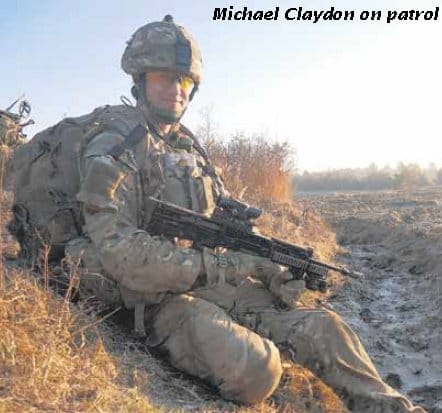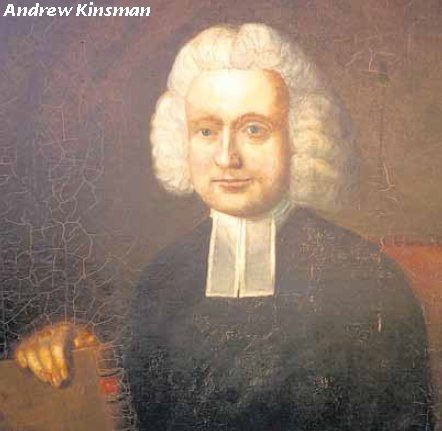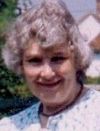Brave soldiers of Jesus Christ
Born in 1983, Michael Claydon had army blood in his veins. Possibly unaware of just how many of his forebears had been military men, Michael seemed to be naturally drawn towards army life.
To an adventurous spirit like his, it appeared an ideal way of combining his newly completed medical training with service in a military context. More than this, he knew that as a Christian he could bring the challenge and consolation of the gospel to young men and women, facing situations in which death and serious injury were an ever-present threat.
Helmand
Accepted for the army, Michael was soon offered a commission in the Royal Army Medical Corps and, after passing out of Sandhurst Military Academy, was posted to Germany with 1 Medical Regiment.

Then came an Afghanistan deployment in 2011, with medical responsibilities for an infantry sub-unit based in the Nar-e-Saraj district of Helmand Province. Here was challenge enough for any plucky young man, coupled with an opportunity to serve the Saviour in whom he had trusted since boyhood days.
In his early weeks with the company, Michael was given the courage to own his Christian faith publicly and, before long, a sympathetic officer commanding was glad to allow him to run weekly Bible studies for his infantry unit and even address the company at the Christmas Eve service.
On a number of occasions Michael was required to go out on patrol with his company in his role as medical officer. Tensions ran high in the face of intense incoming enemy fire and at such times the promises of God rang in his mind. Yes, God is indeed the ‘refuge and strength’ of his people and ‘a very present help in trouble’. His life was in God’s hands.
Perhaps too across his mind flashed thoughts of another intrepid ‘soldier’ of Jesus Christ who had also faced threatening situations — one of his own forebears on his mother’s side. Andrew Kinsman was born in 1724, more than 250 years before Michael, and yet with a clearly traceable line directly to Michael’s own mother, Geraldine.
Andrew Kinsman
A contemporary and friend of the great eighteenth-century preacher, George Whitefield, Kinsman also learnt to trust in God’s protecting care in situations of extreme danger. But unlike Michael, he did not have the privilege of being born into a family where Christ was loved and honoured.
Not until he was 17 did he chance upon a sermon about something described as ‘the new birth’, by a certain George Whitefield. This was a dimension of thought Kinsman had never considered before and he was deeply troubled by it.
But who could help him? Only as he turned the pages of a Book of Common Prayer, reading the prayers through carefully, did he gradually gain peace of heart as he realised that his very longings after God were an evidence of ‘new birth’ and a sign of spiritual life.
With heart renewed and aflame with love for Christ, Kinsman could not rest until his own family, and then his neighbours in Tavistock where he lived, had heard the same transforming message.
He read them sermons and pleaded with God for their conversion, only being surprised that more did not respond. Then came news that thrilled young Kinsman: Whitefield himself was calling at nearby Plymouth, en route for America.
Without a moment’s delay he hurried to Plymouth and listened eagerly to the great preacher. But would Whitefield consider coming across to preach in Tavistock, wondered Kinsman? Happy to take any opportunity to reach the people with the gospel, Whitefield accompanied his new friend.
To Kinsman’s amazement, such a degree of hostility broke out when the people of Tavistock understood the implications of Whitefield’s message that Kinsman realised his own opportunities there were limited. He decided to move to Plymouth.
Plymouth
Perhaps an added attraction to 21-year-old Kinsman was the presence there of a young woman who had recently been converted under Whitefield’s preaching. Ann Tiley became an ideal life partner for Andrew.
Like him, she was prepared to sacrifice and suffer for the gospel. Generously, the young couple bought land and helped to fund the building of a meeting house where Andrew could invite preachers to address the people.
Soon the chapel was regularly crammed with eager men and women. But Andrew Kinsman was not satisfied. What about the nearby dockland region of Plymouth? Rough and turbulent, with a rootless populace, the area was challenge enough for Kinsman’s evangelistic endeavours.
And the opposition was relentless. With his voice drowned by up to eight or nine drummers as he attempted to preach, Kinsman regularly expected his home to be demolished or torched by angry opponents.
Even Plymouth Tabernacle was not safe. On one occasion armed sailors broke the windows before bursting into the church. Without mercy they began to bludgeon the congregation left and right, regardless of age or sex.
But they had reckoned without Andrew Kinsman. Seizing the ringleader, he managed to wrest his sword from his hand and drag him from the building. Nor would he let him go despite his angry struggles until he had hauled the culprit hatless and with clothes ripped into the magistrate’s office.
Had Andrew been torn to pieces, his friends wondered? But no, God had fought with him and for him and this triumph gained for the church in Plymouth a more secure future. This was no Afghanistan with enemy ambush and roadside bombs, such as his descendant, Michael, would face, but equally dangerous in many respects.
Ministry
Gradually the cause of the gospel progressed in Plymouth Dock. Andrew Kinsman and his wife Ann were able to open their home for worship. A mere handful gathered at first, but the ardent preacher’s exhortations attracted ever more hearers and, before long, a chapel was built for regular gospel preaching.
But when it was rumoured that George Whitefield was returning from America and was about to dock in Plymouth, vast crowds gathered from all the surrounding area to hear him.
Then came a nightmare scenario: Whitefield was taken ill just before he was due to preach. Who could take his place? Young Kinsman, still in his mid-20s, was the only option.
Weeping secretly with fear, Andrew addressed the people, preaching on that momentous question asked by Balaam long ago, ‘What has God wrought?’ (Numbers 23:23).
The sermon which followed was unforgettable, with many professing faith as a result. And for Kinsman it marked the beginning of an astonishing ministry. Recognising his young friend’s preaching gifts, Whitefield determined to make as much use of him as possible, and before long Andrew Kinsman found himself invited to many unexpected places.

The cost of such an itinerant ministry was high, both emotionally and physically. Not only did he find it hard to leave his wife Ann and their three young children for long periods, but he also suffered from debilitating asthma attacks, which were exacerbated by his long rides on horseback exposed to the elements.
Whitefield’s Tabernacle in Bristol was a pulpit to which Kinsman was constantly asked to return; so much so that Whitefield playfully called it ‘Kinsman’s America’, comparing it with his own far flung labours.
When he announced to his Tottenham Road Tabernacle congregation in London that ‘Kinsman’ would be preaching the following Sunday, excitement ran high among the people, supposing that it must be Whitefield’s relative due to preach.
Disappointment was fleeting, however, and Andrew Kinsman was invited back many times over in the coming years.
Sorrows
Frequent persecution remained the lot of this courageous preacher. A New Testament that he owned was long held in the family, its cover bespattered with stains from rotten eggs. But Kinsman’s gentle and winning disposition made him loved and valued by those who heard him.
Sorrows too were frequent. When John, his three-year-old, drowned after falling down a well, the father’s grief was profound, particularly as he was away from home at the time.
To his wife Ann he wrote: ‘I must tell you that I have never felt sorrow like this’, and yet could hastily add, ‘But the Lord orders all things well’. When Ann herself died in 1774 after a long illness, Andrew was bereft indeed.
Almost 20 years of life were left for Andrew — years in which he continued to travel and preach as long as strength lasted, until his ever-increasing asthma attacks and ‘dropsy’ (now known as heart failure) spelt the end of his earthly life.
He died in 1793, at the age of 69. ‘Jesu, lover of my soul’, he whispered in dying — a testimony to the source of all his confidence and strength.
And Andrew Kinsman is not forgotten. From his family down the centuries have sprung many godly men and women who, like him, have ‘kept the faith’ and, like his many times over great grandson Michael Claydon, have been and are brave soldiers of Jesus Christ.
Faith Cook










